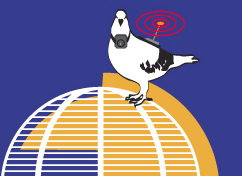Community Domain Papers
|
Absence in Common: An Operator for the Inoperative Community |

|

|

|
|
Written by Kuniko Vroman
|
|
Apr 13, 2006 at 09:48 PM |
absence, community, networks, memorials, communication, space, place Expanding on Jean-Luc Nancy's theory of the Inoperative Community, this paper will draw from recent memorial practices and communication theory to argue for the importance of absence in the construction of sound networks. Blindly celebrated by dystopian modernists, and blissfully ignored by utopian technophiles, the experience of absence is crucial to a nonviolent and just approach to communion. |
|
Last Updated ( May 20, 2006 at 12:05 PM )
|
|
Read more...
|
|
|
Community Networked Tales: Stories and Place of a Dublin |

|

|

|
|
Written by Kuniko Vroman
|
|
Apr 14, 2006 at 04:04 PM |
absence, community networks, memorials, communication, space, place The paper Community Networked Tales: Stories and Place of a Dublin Neighborhood describes the content capture, design and implementation of the Media Portrait of the Liberties project. It focuses primarily on the results of a subjective user study conducted to gauge reactions to this novel media format. We close this paper by discussing the results of this study, and speculating on future directions for this work. |
|
Last Updated ( Jul 21, 2006 at 04:06 PM )
|
|
Read more...
|
|
|
Indigenous Domain: Beyond the Commons and Other Colonial Paradigms |

|

|

|
|
Written by Kuniko Vroman
|
|
Apr 17, 2006 at 11:54 PM |
indigenous, commons, internet, property, belonging, colonize, stories, networks, webs of trust, cyberspace Indigenous Domain discusses the limitations of current colonial paradigms for cyberspace which try to rope off "commons" or "reservations" for the public good, but which still operate within a larger colonial framework. The paper proposes alternatives to the prevailing colonial paradigm of the "commons" and "copyleft" based on both indigenous models and new digital practices including "grounded stories," "indigenous networks," and "webs of trust." Finally, I look at a local Acess Grid art project in the Wabanaki community which combines all three of these indigenous/digital approaches. |
|
Last Updated ( May 20, 2006 at 06:46 PM )
|
|
Read more...
|
|
|
Media Referentiality: "Productive" Knowledge Networks in Experimental Arts |

|

|

|
|
Written by Kuniko Vroman
|
|
Apr 18, 2006 at 12:25 AM |
Self-productive practices,, interdisciplinary avant-garde, collaborative tools in new media, proximity, alternative history structures, content shortcuts, community effects, collective memory The paper will examine the self-referentiality and tools for its development introduced by the avant-garde, experimental interdisciplinary arts movements and will follow these practices in new media. It will survey how theoretical and artistic self-referencing in variety of media have had been a constitutive part of historic collaborative movements. A chapter will be devoted to New Media and will see internet and tools like mailing lists, blogs, wikis and ad-hoc networks as multimedia platforms for self-referentiality. The paper will argue that self-referentiality differs from independent media as it is rather serving as a tool of the internal dialogue, creative collaborative co-production, and invention of new vocabulary. |
|
Last Updated ( May 20, 2006 at 07:03 PM )
|
|
Read more...
|
|
|
Public Secrets: information and social knowledge |

|

|

|
|
Written by Kuniko Vroman
|
|
Apr 17, 2006 at 11:33 PM |
community, public domain, citizenship, information society, social justice, digital inclusion Secrets are the opposite of information. There are secrets that are kept from the public and then there are "public secrets" - secrets that the public chooses to keep safe from itself - like, "don't ask, don't tell." Such shared secrets sustain social and political institutions. The injustices of the war on drugs, the criminal justice system, and the Prison Industrial Complex are "public secrets". This paper will discuss the phenomenon of the "public secret" in the context information culture and present strategies for using information technologies to unmask such secrets. The presentation will reference an online audio database of statements by incarcerated women and injection drug users, which reveal the secret injustices of the war on drugs, the Criminal Justice System and the Prison Industrial Complex. |
|
Last Updated ( May 20, 2006 at 12:55 PM )
|
|
Read more...
|
|
|
The Participatory Challenge: Incentives for Online Collaboration |

|

|

|
|
Written by Kuniko Vroman
|
|
Apr 17, 2006 at 09:14 PM |
self-organized cultural projects, online collaboration, free cooperation, social software, mutual aid Current debates focus too much on what social tools can do and not enough on the people who use them. Motivations of the multitudes who add content to online environments matter a great deal. What follows here are hands-on guidelines and an outline of preconditions for online participation. Terms like: involvement, turn taking, network, feedback, or distributed creativity1 are frequently applied to characterise this kind of social and cultural interaction. |
|
Last Updated ( May 19, 2006 at 02:49 PM )
|
|
Read more...
|
|
|
|
| |
|
|
